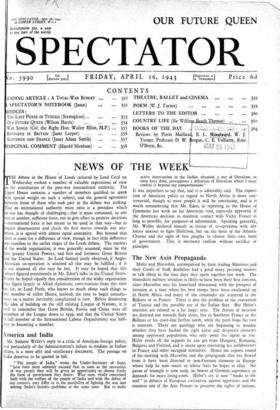HE debate in the House of Lords initiated by Lord
Cecil on Wednesday evoked a number of valuable expressions of view
NEWS OF THE WEEKI n the constitution of the post-war international authority. The *pper House contains a number of members qualified to speak ith special weight on such a subject, and the general agreement etween those of them who took part in the debate was striking. hat an international authority must exist is a postulate which
o one has thought of challenging ; that it must command, in one ay or another, sufficient force, not to give effect to positive decisions
international force is not meant to be used in that way—but to impose disarmament and check the first moves towards war any- here, it is agreed with almost equal unanimity. But beyond that Mere is loom for a difference of view, though in fact little difference was manifest in the earlier stages of the Lords debate. The nucleus of the world organisation, it was generally assumed, must be the four greater United Powers,' and first and foremost Great Britain and the United States. As Lord Samuel justly observed, if Anglo- American co-operation is attained all else may be fulfilled ; if it is not attained all else may be lost. It may be hoped that this subject figured prominently in Mr. Eden's talks in the United States. It may be hoped equally that consideration of the wider organisation may figure largely in Allied diplomatic conversations from this time on, for, as Lord Perth, who knows as much about such things as any member of either House, insisted, the time to begin consulta- tions on a matter inevitably complicated is now. Before dismissing the idea of building on the still existing League of Nations, it is well to remember that Great Britain, Russia and China were all members of the League down to 1939, and that the United States (a full member of. the International Labour Organisation) was half- way to becoming a member.


























